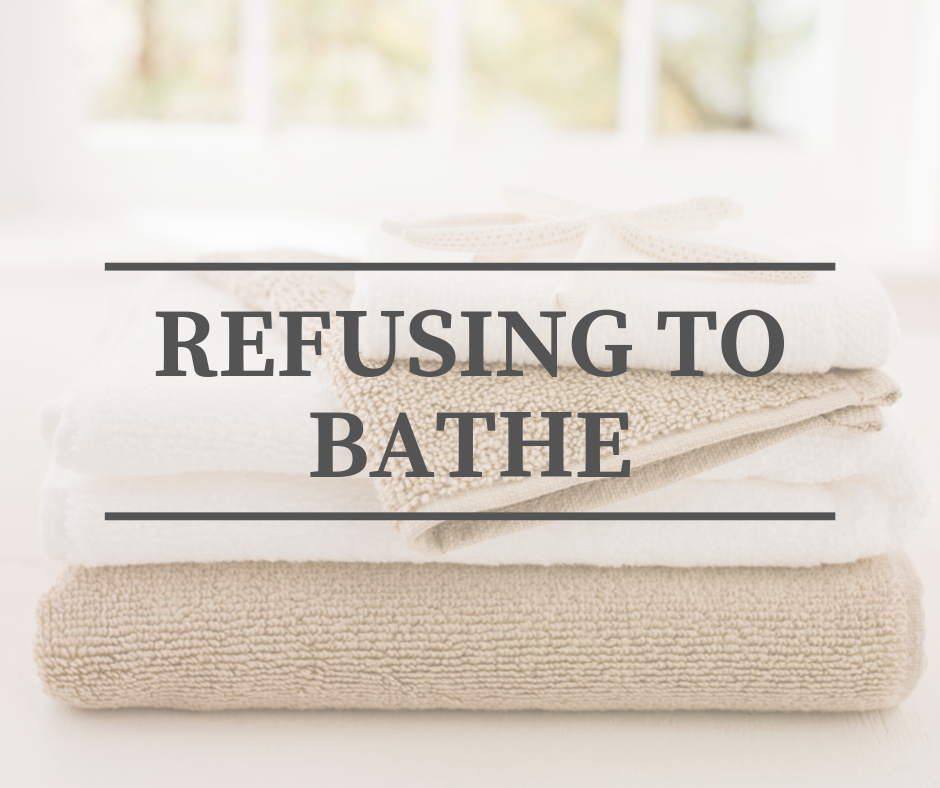Many care partners face the challenge of encouraging and maintaining their loved ones' personal hygiene. Unfortunately this can be a difficult discussion to have and it is important to approach the subject in a kind, caring way. It is important to maintain personal hygiene to maintain one's overall health.
Many persons with dementia might refuse to wash as they are unaware of their personal hygiene situation or may have forgotten that they have not showered. Some individuals might become frustrated or confused when told to bathe. It is important not to use a negative tone when approaching this conversation.
Approach bathing in a positive way
This is much easier said than done. Approach bathing or showering in a positive way and avoid making your loved one feel embarrassed. Encourage them to bathe in a kind manner as opposed to forcing them to bathe or raising your voice. Kindly guide them to the bathroom with all items prepared and encourage them to wash.

Lead by example
Another way to approach bathing is by demonstration. If you encourage them to bathe or shower as you are going to or have already done so, this will make the task feel less daunting. Individuals with dementia might need to see that others are doing it too before they can do it. One way to approach this is to say, "I just got out of the shower, do you want to shower now? It's available."
Involve them in laundry and hygiene tasks
Ask them for help. Persons with dementia still want to feel that they are contributing and what better way then to participate in chores together. Even if they are not as helpful as you would like, encourage them to carry some items to the laundry room or to change into clean clothes after they shower. Ask them if they'd like to help gathering up the dirty clothes and ask if they need to put on a fresh outfit, then lead into having a shower or bath.

Ensure an accessible setup
Visuospatial skills are affected when a person has been diagnosed with dementia. Sometimes we might not notice this, but if your loved one has to step over the edge of the shower or there is a bathmat outside of the shower, this might look as though it is a much larger step and be quite daunting for persons with dementia. If individuals require more assistance, think about installing grab bars or seats in your shower to make it more accessible. If persons with dementia feel the shower setup is not safe for them to use, they simply won't use it.
Offer incentives
Purchase a new shower product for your bathroom. Ask your loved one with dementia if they have seen a new product you purchased and lead them into the bathroom. While in the bathroom, ask if they would like to try it out and bathe or shower. Sometimes this draws their attention to a new item and individuals might want to shower to use this. Another incentive is to setup a radio on your bathroom counter and play their favourite music. This might help to ease their mind and put them in a happier mood. As a result, they might be more willing to shower alongside their favourite song.

Schedule baths and showers on your daily calendar
Hang a calendar in your bathroom or in another room in the house. Write down on the calendar the days you plan on showering and encourage your loved one to have their name on the calendar too. This creates a reference point for persons with dementia as you encourage them to shower on Tuesday, you can look to the calendar and hold them accountable. Developing a routine is important for persons with dementia and makes tasks seem familiar to them, in which they will most likely continue to follow this routine without hesitations.

Bathe prior to events
If you and your loved one with dementia attend a weekly social group, run errands together, or visit family members, encourage them to bathe prior to these events. Approach this by getting ready together and reminding them that they want to look fresh for a new day. Choose an outfit for them to wear that makes them feel comfortable and confident. Encourage them to change into the outfit once they have bathed. Hold them accountable for this and do not leave the house until they have gotten ready.
Consider hiring help
If you have tried many of these strategies, or your loved one with dementia might need more assistance bathing than you can provide, it might be time to consider hiring help. There are many home care companies who bring employees into the home, build a relationship, and help to bathe your loved one with dementia if they need further assistance. This also offers care partners with an hour or two to get caught up with things around the house or to take a break. Reach out to the Alzheimer Society, home care companies or your local LHIN and see what options there are for you and your loved one.
Helpful Resources:
Ontario LHINs: http://www.lhins.on.ca
Alzheimer Society of Ontario: https://alzheimer.ca/en/on
Community Support Connections: https://communitysupportconnections.org/services/care-coordination/
Home Care Assistance: https://homecareassistance.com

